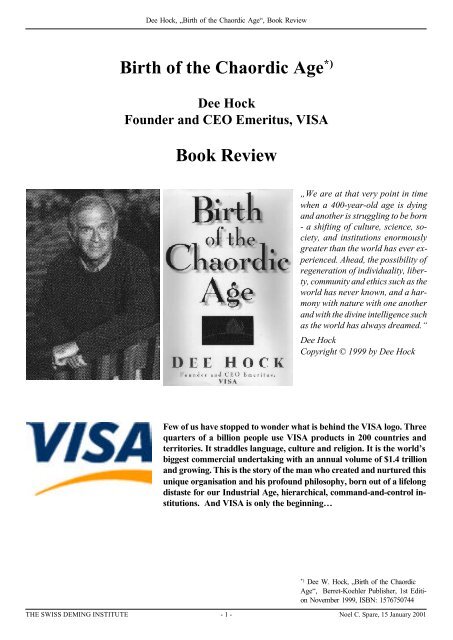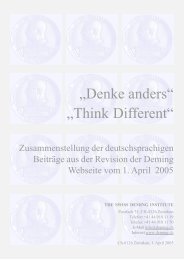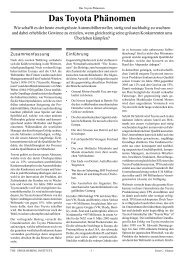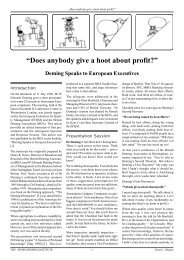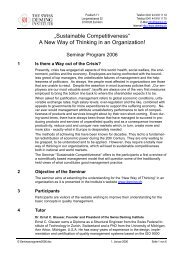Birth of the Chaordic Age*) Book Review - Swiss Deming Institute
Birth of the Chaordic Age*) Book Review - Swiss Deming Institute
Birth of the Chaordic Age*) Book Review - Swiss Deming Institute
Create successful ePaper yourself
Turn your PDF publications into a flip-book with our unique Google optimized e-Paper software.
THE SWISS DEMING INSTITUTE<br />
Dee Hock, „<strong>Birth</strong> <strong>of</strong> <strong>the</strong> <strong>Chaordic</strong> Age“, <strong>Book</strong> <strong>Review</strong><br />
<strong>Birth</strong> <strong>of</strong> <strong>the</strong> <strong>Chaordic</strong> Age *)<br />
Dee Hock<br />
Founder and CEO Emeritus, VISA<br />
<strong>Book</strong> <strong>Review</strong><br />
„We are at that very point in time<br />
when a 400-year-old age is dying<br />
and ano<strong>the</strong>r is struggling to be born<br />
- a shifting <strong>of</strong> culture, science, society,<br />
and institutions enormously<br />
greater than <strong>the</strong> world has ever experienced.<br />
Ahead, <strong>the</strong> possibility <strong>of</strong><br />
regeneration <strong>of</strong> individuality, liberty,<br />
community and ethics such as <strong>the</strong><br />
world has never known, and a harmony<br />
with nature with one ano<strong>the</strong>r<br />
and with <strong>the</strong> divine intelligence such<br />
as <strong>the</strong> world has always dreamed.“<br />
Dee Hock<br />
Copyright © 1999 by Dee Hock<br />
Few <strong>of</strong> us have stopped to wonder what is behind <strong>the</strong> VISA logo. Three<br />
quarters <strong>of</strong> a billion people use VISA products in 200 countries and<br />
territories. It straddles language, culture and religion. It is <strong>the</strong> world’s<br />
biggest commercial undertaking with an annual volume <strong>of</strong> $1.4 trillion<br />
and growing. This is <strong>the</strong> story <strong>of</strong> <strong>the</strong> man who created and nurtured this<br />
unique organisation and his pr<strong>of</strong>ound philosophy, born out <strong>of</strong> a lifelong<br />
distaste for our Industrial Age, hierarchical, command-and-control institutions.<br />
And VISA is only <strong>the</strong> beginning…<br />
*) Dee W. Hock, „<strong>Birth</strong> <strong>of</strong> <strong>the</strong> <strong>Chaordic</strong><br />
Age“, Berret-Koehler Publisher, 1st Edition<br />
November 1999, ISBN: 1576750744<br />
- 1 - Noel C. Spare, 15 January 2001
For anyone who has wondered why our<br />
institutions and organisations seem less<br />
and less able to deliver on <strong>the</strong> purposes<br />
for which <strong>the</strong>y were created, <strong>the</strong>re can be<br />
no better place to start to find answers than<br />
in this book.<br />
Dee Hock is probably best known as <strong>the</strong><br />
man who founded and ran VISA, <strong>the</strong><br />
world's largest commercial organisation,<br />
but do not think that this book is a turgid<br />
trawl through <strong>the</strong> world <strong>of</strong> high finance and<br />
consumer credit by a man with a passion<br />
for credit cards. Nothing could be fur<strong>the</strong>r<br />
from <strong>the</strong> truth. Nei<strong>the</strong>r is it a 1-2-3 management<br />
book - easy steps on <strong>the</strong> road to management<br />
salvation; it is much more than<br />
that. It is an incredible story <strong>of</strong> human<br />
endeavour by a man passionate and unwavering<br />
since childhood, in his belief that<br />
our present concept <strong>of</strong> "Organisation" has<br />
outlived its usefulness. Worse still, it is<br />
now on such a frenzy <strong>of</strong> consumption that<br />
it is feeding <strong>of</strong>f itself and plunging human<br />
life and <strong>the</strong> biosphere that supports it into<br />
irreversible decline.<br />
This is a book about <strong>the</strong> triumph <strong>of</strong> <strong>the</strong><br />
human spirit which refuses to be bowed<br />
by <strong>the</strong> dysfunctional machinations <strong>of</strong> what<br />
passes today as organisation. Of a man<br />
unable to shake <strong>of</strong>f his convictions and<br />
loosen <strong>the</strong> shackles <strong>of</strong> his ever questioning<br />
"Old Monkey" rational mind - and does<br />
this Old Monkey know how to ask questions?<br />
After more than half a lifetime spent<br />
as a "bloodied sheep" - failure upon humiliating<br />
failure and deep depression with<br />
only nature and a family that he has difficulty<br />
supporting to hold him in <strong>the</strong> real<br />
world - he falters. He takes up what he<br />
describes as <strong>the</strong> most popular career<br />
choice in modern organisations - "retirement<br />
on-<strong>the</strong>-job". So begins an odyssey<br />
that even a fiction writer would be hard put<br />
to imagine.<br />
What emerges from <strong>the</strong> pages is a philosophy<br />
explained with candour and clarity with<br />
<strong>the</strong> noble purpose <strong>of</strong> liveable lives for our<br />
children and <strong>the</strong>ir descendants. That does<br />
not make it easy however, <strong>the</strong> difficulty<br />
being in <strong>the</strong> mindset <strong>of</strong> <strong>the</strong> reader, confined<br />
as we are by <strong>the</strong> iron cages <strong>of</strong> hierarchy<br />
and bureaucracy. Sounds hard? Well,<br />
to begin to understand this book it may be<br />
necessary to suspend some long-held beliefs<br />
to enable us to penetrate <strong>the</strong> prevailing<br />
concept <strong>of</strong> organisation, buttressed as<br />
it is by dogma and protected by an encircling<br />
moat <strong>of</strong> platitudes. To think thoughts<br />
that <strong>the</strong> prevailing tyranny ensures remain<br />
suppressed in our sub-conscious.<br />
Dee Hock, „<strong>Birth</strong> <strong>of</strong> <strong>the</strong> <strong>Chaordic</strong> Age“, <strong>Book</strong> <strong>Review</strong><br />
Hock places <strong>the</strong> origin <strong>of</strong> organisational<br />
methodology with René Decartes, 400<br />
years ago. He is hard on science, perhaps<br />
it is deserved, it never explained itself very<br />
well. But science did change from its Cartesian<br />
/ Newtonian approach. Perhaps no<br />
one expressed that change more eloquently<br />
than William James did almost a century<br />
ago. It is <strong>the</strong> management <strong>of</strong> our institutions<br />
and organisations that did not change<br />
and leaves us with old Industrial Age Taylorian<br />
frameworks trying to support information<br />
age, industrial, commercial and social<br />
administrative systems.<br />
Scientific methodology that believed that<br />
all things could be explained with a logical,<br />
linear, precise, orderly, mechanistic rationale<br />
began to be undermined by Karl Friedrich<br />
Gauss before 1800. From <strong>the</strong>n on all<br />
measurements and all perceptions would<br />
be "fuzzy", with <strong>the</strong> fuzziness delineated<br />
by Gauss's immortal curve - science moved<br />
forward - in harmony with uncertainty,<br />
recognising that an exact picture <strong>of</strong> <strong>the</strong><br />
physical world was unattainable. Nowhere<br />
was this more beautifully illustrated than<br />
by Ludwig Boltzmann with his descriptive<br />
formula that delineates between order and<br />
disorder in <strong>the</strong> atomic world. But Boltzmann<br />
had to endure <strong>the</strong> tyranny <strong>of</strong> his peers<br />
and, believing <strong>the</strong> battle to be lost, committed<br />
suicide in 1906. Yet, without Boltzmann,<br />
it is unlikely that Dee Hock, 70 years<br />
later, would have even been able to contemplate<br />
<strong>the</strong> world-wide transfer <strong>of</strong> value<br />
on a stream <strong>of</strong> ordered charged particles.<br />
Hock is not averse to using scientific metaphors<br />
in his quest to penetrate <strong>the</strong> nature<br />
<strong>of</strong> organisation and leadership. To<br />
dissect words to arrive at meaning and to<br />
find <strong>the</strong> most fundamental particles <strong>of</strong> organisation<br />
so that we may restart and build<br />
a new model, not like it was, or is, or might<br />
become, but like it ought to be.<br />
The search for harmony between opposites<br />
is at <strong>the</strong> crux <strong>of</strong> this book - hence it's<br />
title. Agreement, disagreement; order, chaos;<br />
pride, humility: independence, interdependence;<br />
competition, collaboration.<br />
Hock invokes nature to demonstrate <strong>the</strong><br />
delicate harmonic balance that exists in an<br />
undisturbed eco-system and <strong>the</strong> seamless<br />
blending <strong>of</strong> opposites. But <strong>the</strong> concept is<br />
universal - literally. The Universe is, to use<br />
his word, "chaordic".<br />
The framework for future organisation,<br />
Hock advocates, is community, based on a<br />
strong shared purpose and values that<br />
enables people to use <strong>the</strong>ir intrinsic motivation<br />
and powers <strong>of</strong> self-organisation to<br />
produce extraordinary results. Sceptical?<br />
See VISA. Many readers <strong>of</strong> this website<br />
will already be familiar with <strong>the</strong> expression<br />
"Extraordinary results from ordinary people".<br />
Some may have even been privileged<br />
to witness it. Too <strong>of</strong>ten however, it is no<br />
more than a tantalising glimpse. It never<br />
seems to last very long. It <strong>of</strong>ten comes<br />
about when we have our backs to <strong>the</strong> wall<br />
and conventional wisdom relents, allowing<br />
creativity and self organisation to flourishes<br />
long enough for <strong>the</strong> crisis to be averted<br />
before <strong>the</strong> iron cage closes and <strong>the</strong> status<br />
quo is restored. The second law <strong>of</strong><br />
<strong>the</strong>rmodynamics - order tends to vanish -<br />
is unrelenting.<br />
For some readers <strong>the</strong> idea <strong>of</strong> self-organisation<br />
might seem laissez-aller. This would<br />
be a mistaken impression however, which<br />
Hock allays as he describes <strong>the</strong> rigour with<br />
which Purpose, Principles, People, Concept,<br />
Structure and Practice need to be<br />
addressed in order to establish <strong>the</strong> framework<br />
<strong>of</strong> community. In o<strong>the</strong>r words organisation<br />
will be no less demanding, probably<br />
it will be even more demanding since<br />
we will have to learn a new paradigm whilst<br />
battling against <strong>the</strong> restraints <strong>of</strong> <strong>the</strong> old. It<br />
might be a lot more fun though, working in<br />
an environment in which behaviour is induced<br />
and not compelled.<br />
Scholars and students <strong>of</strong> Shewhart and<br />
<strong>Deming</strong> may, at first, be more than a little<br />
miffed by Hock's invective against measurement,<br />
uniformity and control. It seems a<br />
far cry from <strong>Deming</strong>'s, "The right quality<br />
and uniformity are foundations <strong>of</strong> commerce,<br />
prosperity and peace". At <strong>the</strong> same<br />
time <strong>the</strong>re seems total unison in <strong>the</strong> assertions<br />
that "There is no true value <strong>of</strong><br />
anything", "There is no such thing as zero<br />
defects" (No absolutes), "Without an aim<br />
<strong>the</strong>re is no system" and "The most important<br />
figures in any organisation are<br />
unknown and unknowable". What lies at<br />
<strong>the</strong> bottom <strong>of</strong> this apparent dichotomy?<br />
Are we not back here to opposites? Dichotomy<br />
and paradox are very <strong>of</strong>ten evidence<br />
<strong>of</strong> a higher truth, a truth that both<br />
honours and at <strong>the</strong> same time elevates two<br />
seemingly contradictory concepts into a<br />
greater principle for integration and more<br />
optimal operation. We have to remember<br />
too, that Hock is describing prevailing organisation<br />
not as it might be, or, as many<br />
visitors to <strong>the</strong> site will believe, it ought to<br />
be, but as it is. He eloquently explains how<br />
we are caught in such a tide <strong>of</strong> data that we<br />
have ever diminishing possibilities <strong>of</strong> converting<br />
even a small proportion <strong>of</strong> it into<br />
knowledge and <strong>the</strong>refore, have to fall back<br />
Noel C. Spare, 15 January 2001 - 2 -<br />
THE SWISS DEMING INSTITUTE
more and more on mechanistic command<br />
and control as a substitute for knowledge.<br />
Perhaps, more than 70 years ago, Walter<br />
Shewhart had <strong>the</strong> key. By a partnership<br />
between science and philosophy he founded<br />
a methodology which separated raw<br />
data into that to which we could and should<br />
react in a linear, mechanistic way and that<br />
to which we could not and should not react<br />
linearly and mechanistically (most <strong>of</strong><br />
it). In o<strong>the</strong>r words, when we should leave<br />
processes and systems alone. What happened?<br />
Few understood or even listened<br />
and for more than a century we have been<br />
on an orgy <strong>of</strong> institutionalised tampering<br />
(or tinkering, to use Hock's expression). We<br />
have pursued this "endeavour" with such<br />
abandon and total disregard <strong>of</strong> <strong>the</strong> consequences<br />
and have even conspired, somehow,<br />
to make it a virtue. It sits at <strong>the</strong> high<br />
alter <strong>of</strong> organisation - above logic, above<br />
people, above knowledge, so that now,<br />
even as <strong>the</strong> very planet rebels, we seem<br />
unable to comprehend that liveable lives<br />
for our descendants hangs in <strong>the</strong> balance.<br />
We are truly sitting on a "knife's-edge".<br />
No one should have to be an apologist for<br />
Shewhart, <strong>the</strong> full realisation <strong>of</strong> his work is<br />
still, by <strong>Deming</strong>'s estimate, a few decades<br />
<strong>of</strong>f, but why did he use <strong>the</strong> word "control"?<br />
Why do great men use inappropriate<br />
words? No amount <strong>of</strong> semantic argument<br />
can ever undo <strong>the</strong> consequential misunderstanding<br />
and even abuse <strong>of</strong> a conceptual<br />
philosophy that uses <strong>the</strong> word "control"<br />
in it's title, when "behaviour" or "understanding"<br />
or "insight" would, with hindsight,<br />
have served it's purpose better. It<br />
played right into <strong>the</strong> hands <strong>of</strong> <strong>the</strong> despots.<br />
Likewise, what possessed Max Weber, <strong>the</strong><br />
German sociologist who produced perhaps<br />
<strong>the</strong> defining work on bureaucracy, to describe<br />
it as "Ideal" when it was a methodology<br />
that he clearly hated? When Dee Hock<br />
rails against bureaucracy it is like listening<br />
to Max Weber talking nearly a century before.<br />
What <strong>the</strong>n <strong>of</strong> <strong>the</strong> word "<strong>Chaordic</strong>"? Let us<br />
hope that by <strong>the</strong> fusion <strong>of</strong> "chaos" and<br />
"order" it's uniqueness will ensure that robbers<br />
will not want to steal it.<br />
Perhaps we should finish with Weber on<br />
bureaucracy, in a rare moment when he lets<br />
his objectivity fall:<br />
"No one knows who will live in this cage<br />
in <strong>the</strong> future, or whe<strong>the</strong>r at <strong>the</strong> end <strong>of</strong> this<br />
tremendous development entirely new prophets<br />
will arise, or <strong>the</strong>re will be a great<br />
THE SWISS DEMING INSTITUTE<br />
Dee Hock, „<strong>Birth</strong> <strong>of</strong> <strong>the</strong> <strong>Chaordic</strong> Age“, <strong>Book</strong> <strong>Review</strong><br />
rebirth <strong>of</strong> old ideas and ideals or, if nei<strong>the</strong>r,<br />
mechanised petrification embellished<br />
with a sort <strong>of</strong> convulsive self-importance.<br />
For <strong>of</strong> <strong>the</strong> last stage <strong>of</strong> this cultural development,<br />
it might well be truly said ´Specialists<br />
without spirit, sensualists without<br />
heart; this nullity imagines that it has obtained<br />
a level <strong>of</strong> civilisation never before<br />
achieved`".<br />
"New prophets"? Dee Hock may just be<br />
one. We in this <strong>Institute</strong> highly recommend<br />
this book to all it's visitors and even if, like<br />
us, you find some <strong>of</strong> its concepts hard to<br />
grasp at <strong>the</strong> first reading, it's still a damn<br />
good read. And you can always read it<br />
again when <strong>the</strong> breadth <strong>of</strong> Hock's inspired<br />
message will grow ever more pr<strong>of</strong>ound.<br />
The author wishes to thank Mat<strong>the</strong>w Cross<br />
<strong>of</strong> LeadershipAlliance.com for his helpful<br />
comments and suggestions.<br />
Address <strong>of</strong> <strong>the</strong> Author<br />
Noel C. Spare<br />
THE SWISS DEMING INSTITUTE<br />
P.O. Box 71, CH-8126 Zumikon<br />
Telephone 0041 1 918 11 19<br />
Telefax 0041 1 918 11 70<br />
E-Mail info@deming.ch<br />
Internet www.deming.ch<br />
- 3 - Noel C. Spare, 15 January 2001


